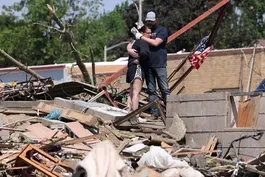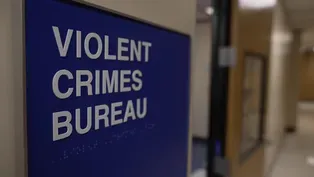
First Black astronaut flies in space after 63-year wait
Clip: 5/22/2024 | 5m 52sVideo has Closed Captions
First Black astronaut candidate on making it to space after 63-year wait
More than 60 years after he was selected but ultimately passed over to become this country’s first Black astronaut, Ed Dwight finally made it to space. He flew aboard Blue Origin's New Shepard rocket as it skimmed space on a roughly ten-minute flight. Geoff Bennett sat down with Dwight to discuss his long journey.
Problems with Closed Captions? Closed Captioning Feedback
Problems with Closed Captions? Closed Captioning Feedback
Major corporate funding for the PBS News Hour is provided by BDO, BNSF, Consumer Cellular, American Cruise Lines, and Raymond James. Funding for the PBS NewsHour Weekend is provided by...

First Black astronaut flies in space after 63-year wait
Clip: 5/22/2024 | 5m 52sVideo has Closed Captions
More than 60 years after he was selected but ultimately passed over to become this country’s first Black astronaut, Ed Dwight finally made it to space. He flew aboard Blue Origin's New Shepard rocket as it skimmed space on a roughly ten-minute flight. Geoff Bennett sat down with Dwight to discuss his long journey.
Problems with Closed Captions? Closed Captioning Feedback
How to Watch PBS News Hour
PBS News Hour is available to stream on pbs.org and the free PBS App, available on iPhone, Apple TV, Android TV, Android smartphones, Amazon Fire TV, Amazon Fire Tablet, Roku, Samsung Smart TV, and Vizio.
Providing Support for PBS.org
Learn Moreabout PBS online sponsorshipGEOFF BENNETT: More than 60 years after he was selected, but ultimately passed over to become this country's first Black astronaut, Ed Dwight finally made it to space.
On Sunday, he flew aboard Blue Origin's New Shepard 25 rocket as it skimmed space on a roughly 10-minute flight.
Ed Dwight was an Air Force pilot when then-President John F. Kennedy championed him as a candidate for NASA's early astronaut corps.
But his plans for space travel were sidelined, and he was never granted the opportunity due to racism within the program.
Dwight left the air force and went on to make a name for himself as a celebrated artist and sculptor.
With Sunday's flight, he makes history as the oldest person to ever go to space at age 90.
I spoke with Ed Dwight earlier, and I asked him about his historymaking flight.
ED DWIGHT, Former U.S. Air Force Pilot: I was more interested in the power and the noise and the lifting, going straight up in the air, instead of flying an airplane from a runway or something.
And it was quite fast.
And we got up to the speed fairly quickly.
The getting into space part was more interesting to me than anything else.
The weightlessness, I had -- I lived in a world of weightlessness, so that didn't bother me.
I never got out of my seat.
We were laying down in the capsule, so I never got out of my seat.
There was a big 10-foot-tall window that was next to me, and I was more fascinated with what was going on outside than what was going on inside.
When we did get a zero-g, the other members of the crew, they had designed a dance.
These are all grown men now designing a dance that they -- a ballerina dance that they were going to do during the weightlessness.
So, I kind of watched them a little bit, but, again, I spent all my time looking outside.
The thing that kind of shocked me a little bit was the separation, because they have explosive bolts to hold the capsule to the booster.
And it was extremely loud, and it felt like we ran into something, and I was confidently sure that we were destined to fall to Earth.
GEOFF BENNETT: Did you feel a sense of vindication?
Did you feel any semblance of justice, especially given the way that you were denied the opportunity to go to space some 60 years ago, despite being eminently qualified and being tapped by then President John F. Kennedy?
ED DWIGHT: Right.
Well, people -- that's a big question that they ask.
And for 60 years, I actually told myself that, oh, hell, I didn't need that, because I'm an action soldier, and I'm always going out and doing things positive, and doing big projects, and having a good time at it.
And so I didn't have a lot of time to think about being angry or sorrowful or anything of the sort, because I had to take a look at the job that was my job at 60 years ago.
And my -- if you look at it philosophically, my job was to start a conversation about Blacks in space, and that was my job.
But, then again, as I got closer and closer to it, especially in the last few days, I got to thinking about it, and I said, well, this thing is really going to happen here.
It took 20 years for them to come around to that.
But here I was -- I was making art for NASA.
They were flying my sculptures into space.
They were naming asteroids after me.
And I knew all the Black astronauts really, really well, because we were all buddies.
And we had a club, and we called ourselves the Afronauts.
(LAUGHTER) GEOFF BENNETT: Well, let me ask you about that, because when you returned to Earth on Sunday, you were greeted by NASA astronauts, space shuttle veterans Leland Melvin, Charlie Bolden and Bernard Harris.
ED DWIGHT: Right.
GEOFF BENNETT: And from where I sit, their success is directly linked to your experience, to your sacrifice.
Do you see it that way?
ED DWIGHT: Oh, of course I do, because they tell me that every time we talk.
"If it wasn't for you, Ed, we wouldn't be doing this."
And it was kind of an accepted kind of relationship that we had.
And so they just consider me one of them that just hadn't gone up.
So I have been close to the program, and I have been close.
I have got a big display at -- in the Pentagon.
And I have been recognized all these years.
And nobody has just -- like I was isolated and living on another planet or anything.
And every one of these guys considered me a part of it.
So that part was good.
So it all came together at the tail end of the thing last Sunday.
GEOFF BENNETT: So, Mr. Dwight, congratulations on your historymaking flight.
And thanks so much for being with us today.
We appreciate it.
ED DWIGHT: Well, thank you very, very much for having me.
I enjoyed it.
American detained by Syria died in custody, family says
Video has Closed Captions
Family of American held by Syria demands accountability after learning he died in custody (6m 22s)
Amy Tan turns her literary gaze on the world of birds
Video has Closed Captions
Amy Tan turns her literary gaze on the world of birds in 'The Backyard Bird Chronicles' (7m 35s)
Deadly tornado devastates small town of Greenfield, Iowa
Video has Closed Captions
Small Iowa town becomes latest community devastated in active tornado season (3m 16s)
Rep. Raskin on urging DOJ to investigate 'big oil'
Video has Closed Captions
Rep. Raskin on urging DOJ to investigate 'big oil' for deception on climate change (6m 25s)
Social media's role in the rise of youth violence
Video has Closed Captions
Social media's role in the rise of youth violence (8m 6s)
Trump's plans for healthcare, reproductive rights if he wins
Video has Closed Captions
Trump's plans for healthcare and reproductive rights if he returns to White House (7m 20s)
Providing Support for PBS.org
Learn Moreabout PBS online sponsorshipSupport for PBS provided by:
Major corporate funding for the PBS News Hour is provided by BDO, BNSF, Consumer Cellular, American Cruise Lines, and Raymond James. Funding for the PBS NewsHour Weekend is provided by...

















